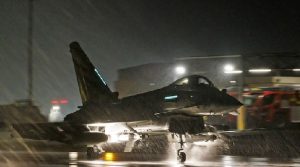24-01-2024
WASHINGTON/ LONDON: The United States and Britain carried out large-scale military strikes on Monday against eight sites in Yemen controlled by Houthi militants, according to the two countries. The strikes signaled that the Biden administration intends to wage a sustained and, at least for now, open-ended campaign against the Iran-backed group that has disrupted traffic in vital international sea lanes.
 The strikes, the eighth in nearly two weeks hit multiple targets at each site, and were bigger and broader than a recent series of more limited attacks against individual Houthi missiles that the Americans said popped up on short notice. Those missiles were hit before they could be fired at ships in the Red Sea or the Gulf of Aden but the planned nighttime strikes on Monday, which hit radars, as well as drone and missile sites and underground weapons storage bunkers, were smaller than the first retaliatory salvos on Jan. 11. Those hit more than 60 targets in nearly 30 sites across Yemen in an expansion of the conflict in the Middle East that the Biden administration had sought to avoid.
The strikes, the eighth in nearly two weeks hit multiple targets at each site, and were bigger and broader than a recent series of more limited attacks against individual Houthi missiles that the Americans said popped up on short notice. Those missiles were hit before they could be fired at ships in the Red Sea or the Gulf of Aden but the planned nighttime strikes on Monday, which hit radars, as well as drone and missile sites and underground weapons storage bunkers, were smaller than the first retaliatory salvos on Jan. 11. Those hit more than 60 targets in nearly 30 sites across Yemen in an expansion of the conflict in the Middle East that the Biden administration had sought to avoid.
This middle ground reflects the administration’s attempt to chip away at the Houthis’ ability to menace merchant ships and military vessels but not hit so hard as to kill large numbers of Houthi fighters and commanders, and potentially unleash even more mayhem into a region already teetering on the edge of a wider war.
“Let us reiterate our warning to Houthi leadership: We will not hesitate to defend lives and the free flow of commerce in one of the world’s most critical waterways in the face of continued threat,” the American and British governments said in a statement.
They were joined in the statement by the Netherlands, Australia, Canada and Bahrain which, as they did in the Jan. 11 strikes, also participated, providing logistics, intelligence and other support, according to US officials.
 Taken together, however, the US-led strikes, in an operation the military calls Poseidon Archer, have so far failed to deter the Houthis from attacking shipping lanes to and from the Suez Canal that are critical for global trade. The Iran-backed group says it will keep up its attacks in what it says is a protest against Israel’s military campaign in Gaza against Hamas.
Taken together, however, the US-led strikes, in an operation the military calls Poseidon Archer, have so far failed to deter the Houthis from attacking shipping lanes to and from the Suez Canal that are critical for global trade. The Iran-backed group says it will keep up its attacks in what it says is a protest against Israel’s military campaign in Gaza against Hamas.
Indeed, the Houthis remained defiant on Monday after the strikes by carrier-based Navy FA-18 fighter jets, Tomahawk cruise missiles and British Typhoon warplanes. “Retaliation against American and British attacks is inevitable, and any new aggression will not go unpunished,” a Houthi military spokesman, Yahya Sarea, said in a statement before the latest American strikes.
The Houthis claimed on Monday to have attacked an American military cargo ship, Ocean Jazz, in the Gulf of Aden, but the White House and Pentagon denied such an assault had happened.
President Biden said on Thursday that US airstrikes against the Houthis would continue. “Are they stopping the Houthis? No,” Biden said. “Are they going to continue? Yes.”
On Sunday, Jon Finer, a deputy national security adviser, offered a glimpse into the administration’s emerging strategy toward the Houthis forged in several high-level White House meetings in recent days, senior US officials said. (Int’l News Desk)
 Pressmediaofindia
Pressmediaofindia




